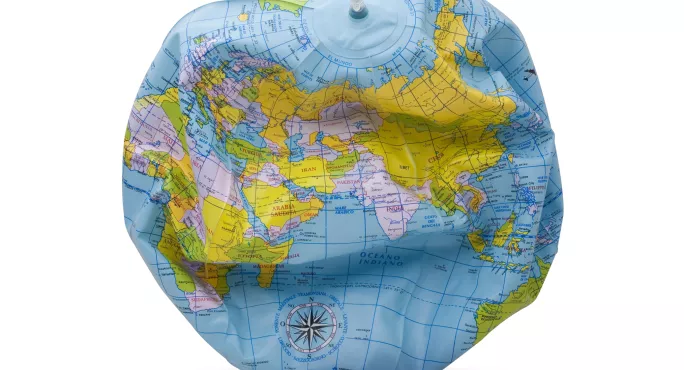
- Home
- Teaching & Learning
- Secondary
- GCSE 2022: ‘The potential inequality is evident’
GCSE 2022: ‘The potential inequality is evident’

Geography teachers are well used to dressing for windy weather. But recent announcements may leave them feeling blown from pillar to post.
Despite all the challenges of Covid, this summer should have been cause for pride across the geographical community: teacher-assessed grades completed, Department for Education announcements that permitted schools to undertake day visits and residential fieldwork, GCSE numbers reaching 268,000 candidates, and entries to A-level geography increasing by 16 per cent.
However, of much more immediate concern are Ofqual’s proposals for the 2022 GCSEs, which, mid-course, would introduce optionality into next summer’s exams. For example, one of the GCSE courses affected by these proposals will ask pupils to answer questions on either the changing economic world or resource management - not both as in previous years.
It is right to seek to support schools’ Covid catch-up endeavours. Using options to reduce content (or slimming course content itself) can help.
Geography GCSE: significant challenges
However, the thorny practicalities of how and when such decisions are implemented during a live course present significant challenges, which the Royal Geographical Society (RGS) previously raised with Ofqual back in the summer of 2020.
At that time, the RGS suggested that, if there was the appetite for optionality, then this should be explored with urgency by the awarding organisations, Ofqual and subject experts, including the RGS, the Geographical Association and others.
The opportunity for proposals that might have gained support from key stakeholders across the community was lost.
So, today, geography teachers face this issue but with the imminent deadline of 1 August to respond. If implemented, their past decisions about the order in which their course was taught - which can vary from school to school - will have profound implications.
If the optional units were covered during Year 10, teachers may feel they have disadvantaged their pupils, who would enter Year 11 facing a full curriculum of required units.
Conversely, other schools, who fall on the positive side of Ofqual’s proposal, would be able to cherry pick their preferred optional topics for Year 11 and free up time, allowing them to revisit the required units and potentially extra revision.
As one teacher says: “The potential inequality is evident.” Another teacher, whose pupils would actually benefit from the proposal, says: “Students should not be penalised for the order of topics taught based on decisions made a year ago.”
Geography teachers: ‘It’s ridiculous’
The feedback from those teachers whose pupils look to lose most from the proposals is clear: “We have taught the now-optional units and will spend Year 11 having to teach the now compulsory ones, whereas other schools might be in a position to revise content more thoroughly.”
Another says: “It’s so ridiculous. We’ve taught most of paper one (just climatic hazards left to do) but still have UK human to do. Will need to redo most of paper three.”
I do see support from geography teachers for the broad principle of reducing content or providing some additional optionality for the GCSE specifications. However, undertaking such profound changes halfway through a live course has caused alarm.
In addition, Ofqual’s proposals stand in contrast to the findings outlined in their Optionality: a briefing paper (2020). This argued that “introducing/expanding optionality in specifications and examinations which do not currently have it, and doing so at pace, risks disadvantaging students”[ and “might well further disadvantage the groups that it intended to help”.
With respect to the 2021 exam series, this briefing paper concluded with the statement that “it is not the case that introducing/increasing optionality is a risk-free way of ensuring safe delivery of the summer examination series”.
The RGS believes that it is right to seek to mitigate the impact of Covid on young people’s education. Our consultation responses have offered practical suggestions in relation to possible accommodations that could be made to GCSE and A-level geography during the pandemic.
We have also worked to support schools with the changes that have been implemented, namely the removal of the requirement to report on fieldwork for the 2022 GCSE and A levels. Since half-term, scores of schools have been sharing news of their fieldwork activities on social media.
There is reassurance for them - and all other schools - that they will not have to report on whether they undertook the full range of fieldwork that would normally be expected for GCSE or A level.
However, turning to the new proposal for introducing mid-course optionality, it is difficult to see how this can be applied fairly to all - and, for this reason, it should be rejected.
Steve Brace is head of education and outdoor learning at the Royal Geographical Society (with IBG). You can follow him on Twitter at @SteveBraceGeog
You need a Tes subscription to read this article
Subscribe now to read this article and get other subscriber-only content:
- Unlimited access to all Tes magazine content
- Exclusive subscriber-only stories
- Award-winning email newsletters
- Unlimited access to all Tes magazine content
- Exclusive subscriber-only stories
- Award-winning email newsletters
You need a subscription to read this article
Subscribe now to read this article and get other subscriber-only content, including:
- Unlimited access to all Tes magazine content
- Exclusive subscriber-only stories
- Award-winning email newsletters
- Unlimited access to all Tes magazine content
- Exclusive subscriber-only stories
- Award-winning email newsletters
topics in this article



